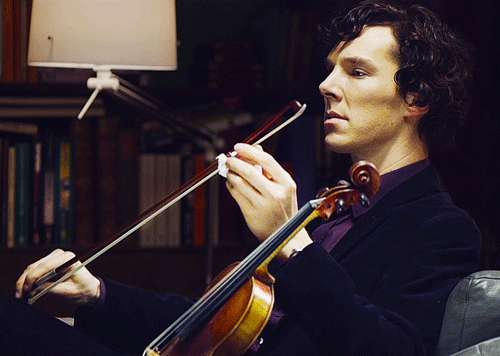當(dāng)前位置: Language Tips> 名著選讀
分享到

《神探夏洛克》圣誕特輯在新年上映了,這次“神夏”回到了1895年,回到了最初,倫敦迷霧中那個(gè)頎長瘦削的身影。
片中充滿了對原著致敬的小細(xì)節(jié),讓原著粉們激動了,畢竟,那是初心。
所以,不如我們借此機(jī)會來回顧經(jīng)典,重溫一下柯南道爾筆下的那個(gè)古怪又迷人的偵探形象。
山鷹般的面容
演繹過福爾摩斯的演員無數(shù),但也許杰里米·布雷特(Jeremy Brett)版的福爾摩斯最符合原著形象了吧。

His very person and appearance were such as to strike the attention of the most casual observer. In height he was rather over six feet, and so excessively lean that he seemed to be considerably taller.
他的相貌和外表極為引人注目,即便是最不經(jīng)意的人看見了也難忘。他有六英尺多高,身體異常瘦削,因此顯得格外頎長。
His eyes were sharp and piercing; and his thin, hawk-like nose gave his whole expression an air of alertness and decision. His chin, too, had the prominence and squareness which mark the man of determination.
他目光銳利;細(xì)長的鷹鉤鼻子使他的相貌顯得格外機(jī)警、果斷;下顎方正而突出,說明他是個(gè)非常有毅力的人。
極端工作狂
福爾摩斯是個(gè)極端工作狂,有案可破時(shí),渾身似有使不完的精力,在無事可做時(shí)卻萎靡不振。

Nothing could exceed his energy when the working fit was upon him; but now and again a reaction would seize him, and for days on end he would lie upon the sofa in the sitting-room, hardly uttering a word or moving a muscle from morning to night.
在他高興工作的時(shí)候,絕沒有人能比得上他那份旺盛的精力;可是常常也會上來一股相反的勁頭,整天地躺在起居室的沙發(fā)上,從早到晚,幾乎一言不發(fā),一動不動。
他這樣描述自己對任何可以刺激頭腦的事物的渴求:
My mind rebels at stagnation. Give me problems, give me work, give me the most abstruse cryptogram, or the most intricate analysis, and I am in my own proper atmosphere. I can dispense then with artificial stimulants. But I abhor the dull routine of existence. I crave for mental exaltation.
一遇無事可做的時(shí)候,我就會心緒不寧起來。給我難題,給我工作,給我最深奧的密碼,給我最復(fù)雜的分析工作,這樣我才覺得最舒適,才不需要人為的刺激。我非常憎惡平淡的生活,我追求精神上的興奮。
而且,他有一個(gè)怪癖:思考的時(shí)候不吃飯。
It was one of his peculiarities that in his more intense moments he would permit himself no food, and I have known him to presume upon his iron strength until he has fainted from pure inanition.
他在比較緊張的時(shí)候不讓自己吃東西,這是他的一個(gè)古怪特性。我見過他濫用自己的體力,直到由于營養(yǎng)不足而暈倒。
對此,偵探自己的解釋是:

The faculties become refined when you starve them. Why, surely, as a doctor, my dear Watson, you must admit that what your digestion gains in the way of blood supply is so much lost to the brain. I am a brain, Watson. The rest of me is a mere appendix. Therefore, it is the brain I must consider.
饑餓可以使人體機(jī)能變得敏銳。那,我親愛的華生,做為一個(gè)醫(yī)生,你必須承認(rèn),消化過程得到的供血量等于腦力所損失的供血量。我就是一個(gè)大腦,華生。除此以外我的身體只是一個(gè)附件。所以,我只考慮大腦的需要。
文藝范兒
福爾摩斯會拉小提琴的這個(gè)設(shè)定無疑給這個(gè)嚴(yán)肅冷靜的偵探形象增添了一抹浪漫色彩。

That he could play pieces, and difficult pieces, I knew well, because at my request he has played me some of Mendelssohn's Lieder, and other favourites.
我深知他能拉出一些曲子,而且還是一些很難拉的曲子。因?yàn)樵谖业恼埱笾拢?jīng)為我拉過幾支門德爾松的短歌和一些他所喜愛的曲子。
When left to himself, however, he would seldom produce any music or attempt any recognized air.
可是當(dāng)他獨(dú)自一人的時(shí)候,他就難得會拉出什么象樣的樂曲或是大家所熟悉的調(diào)子了。
但對于福爾摩斯個(gè)人來說,小提琴似乎是幫助他思考的工具。

Leaning back in his arm-chair of an evening, he would close his eyes and scrape carelessly at the fiddle which was thrown across his knee. Sometimes the chords were sonorous and melancholy. Occasionally they were fantastic and cheerful.
黃昏時(shí),他靠在扶手椅上,閉上眼睛,信手彈弄著平放在膝上的提琴。有時(shí)琴聲高亢而憂郁,有時(shí)又古怪而歡暢。
Clearly they reflected the thoughts which possessed him, but whether the music aided those thoughts, or whether the playing was simply the result of a whim or fancy was more than I could determine.
顯然,這些琴聲反映了當(dāng)時(shí)支配著他的某種思潮,不過這些曲調(diào)是否助長了他的這種思潮,或者僅僅是一時(shí)興之所至,我就無法斷言了。
上一篇 : 名著選讀:傲慢與偏見33
下一篇 :
分享到
關(guān)注和訂閱


關(guān)于我們 | 聯(lián)系方式 | 招聘信息
電話:8610-84883645
傳真:8610-84883500
Email: languagetips@chinadaily.com.cn